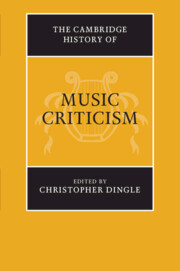Book contents
- The Cambridge History of Music Criticism
- The Cambridge History of Music
- The Cambridge History of Music Criticism
- Copyright page
- Contents
- Music Examples, Figures and Tables
- Notes on Contributors
- Acknowledgements
- Introduction
- Part I The Early History of Music Criticism
- Part II The Rise of the Press
- Part III Critical Influence and Influences
- 12 Critiquing the Canon: The Role of Criticism in Canon Formation
- 13 Comparing Notes: Recording and Criticism
- 14 The Gender Paradox: Criticism of Women and Women as Critics
- Part IV Entering the Twentieth Century
- Part V New Areas
- Part VI Developments since the Second World War
- Postlude
- Bibliography
- Index
12 - Critiquing the Canon: The Role of Criticism in Canon Formation
from Part III - Critical Influence and Influences
Published online by Cambridge University Press: 21 August 2019
- The Cambridge History of Music Criticism
- The Cambridge History of Music
- The Cambridge History of Music Criticism
- Copyright page
- Contents
- Music Examples, Figures and Tables
- Notes on Contributors
- Acknowledgements
- Introduction
- Part I The Early History of Music Criticism
- Part II The Rise of the Press
- Part III Critical Influence and Influences
- 12 Critiquing the Canon: The Role of Criticism in Canon Formation
- 13 Comparing Notes: Recording and Criticism
- 14 The Gender Paradox: Criticism of Women and Women as Critics
- Part IV Entering the Twentieth Century
- Part V New Areas
- Part VI Developments since the Second World War
- Postlude
- Bibliography
- Index
Summary
Music critics wield great power. Their writing influences public opinion and contributes to how audiences receive works. They focus attention upon specific works and musicians, thus justifying these as most worthy of public recognition and debate. They help works to achieve repeat performances, and thereby to establish their places within the performing canon. In the age of recorded sound, they influence sales and affect charts. Although some claim that with the recent rise of ubiquitous digital critical commentary (much of it amateur) professional critics have lost their traditional authority, online criticism continues to exercise considerable sway. In a very real way, critics have been – and continue to be – the gatekeepers of the canon. As Roy Shuker has observed, ‘popular music critics … function as significant gatekeepers and as arbiters of taste’.
- Type
- Chapter
- Information
- The Cambridge History of Music Criticism , pp. 231 - 248Publisher: Cambridge University PressPrint publication year: 2019
- 3
- Cited by

